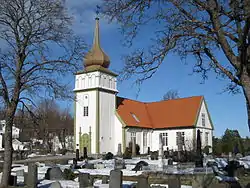Vinger (municipality)
Vinger is a former municipality in the old Hedmark county, Norway. The 499-square-kilometre (193 sq mi) municipality existed from 1838 until 1964 when it became part of Kongsvinger Municipality. The municipality was located in the Vinger region in the southern part of the county, along the border with Sweden. The administrative centre of Vinger was located in the town of Kongsvinger where Vinger Church is located (the town was not actually part of the municipality, but this was where the councils met).[2]
Vinger herred | |
|---|---|
 View of Vinger Church | |
 Hedmark within Norway | |
 Vinger within Hedmark | |
| Coordinates: 60°11′42″N 12°00′38″E | |
| Country | Norway |
| County | Hedmark |
| District | Vinger |
| Established | 1 Jan 1838 |
| • Created as | Formannskapsdistrikt |
| Disestablished | 1 Jan 1964 |
| • Succeeded by | Kongsvinger Municipality |
| Administrative centre | Kongsvinger |
| Area (upon dissolution) | |
| • Total | 499 km2 (193 sq mi) |
| Population | |
| • Total | 6,257 |
| • Density | 13/km2 (32/sq mi) |
| Demonym | Vingersokning[1] |
| Time zone | UTC+01:00 (CET) |
| • Summer (DST) | UTC+02:00 (CEST) |
| ISO 3166 code | NO-0421 |
History
The prestegjeld of Vinger was established as a municipality on 1 January 1838 (see formannskapsdistrikt law). In 1854, the King issued a royal decree that declared the village area around the Kongsvinger Fortress to be a kjøpstad. On 7 February 1855, the town of Kongsvinger (population: 472) was separated from Vinger municipality to become a separate urban municipality. Afterwards, Vinger had a population of 10,947.[3]
In 1864, the southern part of the municipality (population: 6,920) was separated from Vinger to form the new municipality of Eidskog. This division left Vinger with a population of 6,226. On 1 January 1876 a part of Vinger adjacent to the town of Kongsvinger containing 209 inhabitants was transferred to Kongsvinger. During the 1960s, there were many municipal mergers across Norway due to the work of the Schei Committee. On 1 January 1964, the municipality of Vinger (population: 6,257) was merged with the neighboring municipality of Brandval (population: 4,384) and the town of Kongsvinger (population: 2,349) which created a new Kongsvinger Municipality with a total population of 12,990.[3]
Etymology
The whole region was historically called Vinger (Old Norse: Vingr) and this name was given to the municipality upon its creation in 1838. This name could be related to the river Glomma which flows through the region. One could compare this to the English word swing (for the missing s see Indo-European s-mobile). The river Glomma passes through the center of the district where the south-flowing river takes a sharp northwestward turn. This can be compared to the similar Lithuanian word vìngis which means "bend", "bow", or "turn".[2][4]
Government
During its existence, this municipality was governed by a municipal council of directly elected representatives. The mayor was indirectly elected by a vote of the municipal council.[5]
Municipal council
The municipal council (Herredsstyre) of Vinger was made up of 25 representatives that were elected to four year terms. The party breakdown of the final municipal council was as follows:
| Party Name (in Norwegian) | Number of representatives | |
|---|---|---|
| Labour Party (Arbeiderpartiet) | 18 | |
| Conservative Party (Høyre) | 1 | |
| Communist Party (Kommunistiske Parti) | 2 | |
| Centre Party (Senterpartiet) | 3 | |
| Liberal Party (Venstre) | 1 | |
| Total number of members: | 25 | |
| Party Name (in Norwegian) | Number of representatives | |
|---|---|---|
| Labour Party (Arbeiderpartiet) | 18 | |
| Conservative Party (Høyre) | 1 | |
| Communist Party (Kommunistiske Parti) | 2 | |
| Farmers' Party (Bondepartiet) | 2 | |
| Liberal Party (Venstre) | 2 | |
| Total number of members: | 25 | |
| Party Name (in Norwegian) | Number of representatives | |
|---|---|---|
| Labour Party (Arbeiderpartiet) | 15 | |
| Conservative Party (Høyre) | 1 | |
| Communist Party (Kommunistiske Parti) | 4 | |
| Farmers' Party (Bondepartiet) | 2 | |
| Liberal Party (Venstre) | 2 | |
| Total number of members: | 24 | |
| Party Name (in Norwegian) | Number of representatives | |
|---|---|---|
| Labour Party (Arbeiderpartiet) | 14 | |
| Communist Party (Kommunistiske Parti) | 6 | |
| Farmers' Party (Bondepartiet) | 1 | |
| Joint list of the Liberal Party (Venstre) and the Radical People's Party (Radikale Folkepartiet) | 3 | |
| Total number of members: | 24 | |
| Party Name (in Norwegian) | Number of representatives | |
|---|---|---|
| Labour Party (Arbeiderpartiet) | 15 | |
| Communist Party (Kommunistiske Parti) | 5 | |
| Joint list of the Liberal Party (Venstre) and the Radical People's Party (Radikale Folkepartiet) | 3 | |
| Joint List(s) of Non-Socialist Parties (Borgerlige Felleslister) | 1 | |
| Total number of members: | 24 | |
| Party Name (in Norwegian) | Number of representatives | |
|---|---|---|
| Labour Party (Arbeiderpartiet) | 17 | |
| Conservative Party (Høyre) | 1 | |
| Farmers' Party (Bondepartiet) | 1 | |
| Liberal Party (Venstre) | 5 | |
| Total number of members: | 24 | |
| Note: Due to the German occupation of Norway during World War II, no elections were held for new municipal councils until after the war ended in 1945. | ||
Mayors
- 1837-1838: Lars T. Bierkebæk
- 1839-1842: Michael Strøm Lie
- 1844-1847: Mentz Rynning
- 1847-1852: Michael Strøm Lie
- 1853-1854: Sigvald Rynning
- 1855-1859: F.D. Werenskiold
- 1859-1869: Mentz Rynning
- 1870-1870: Petter Holm
- 1871-1872: T. Grønvold
- 1873-1880: Albert Jacobsen
- 1881-1888: Thomas von Westen Engelhart
- 1889-1896: Hans Lemmich Juell
- 1897-1907: C. Larsmoen
- 1908-1913: Otto Olsen Pramm (V)
- 1914-1916: Th. Løvenskiold
- 1917-1919: Christian Eng
- 1920-1929: Ivar Færder (NKP)
- 1930-1931: Ole Smedstad
- 1932-1934: Bottolf Engebretsen
- 1935-1936: Alf Arnesen
- 1937-1940: Ivar Færder (NKP)
- 1941-1945: Kristian Grasmo (NS)
- 1945-1951: Ivar Færder (NKP)
- 1952-1963: Einar Tjernsberg
Notable people
Notable people that were born or lived in Vinger include:
- Jørgen Young (1781–1837), a timber merchant and member of the Storting[13]
- Ivar Færder, a Norwegian newspaper editor and politician who was the mayor of Vinger
References
- "Navn på steder og personer: Innbyggjarnamn" (in Norwegian). Språkrådet.
- Mæhlum, Lars, ed. (10 February 2020). "Vinger". Store norske leksikon (in Norwegian). Kunnskapsforlaget. Retrieved 18 March 2022.
- Jukvam, Dag (1999). Historisk oversikt over endringer i kommune- og fylkesinndelingen (PDF) (in Norwegian). Statistisk sentralbyrå. ISBN 9788253746845.
- Rygh, Oluf (1900). Norske gaardnavne: Hedmarkens amt (in Norwegian) (3 ed.). Kristiania, Norge: W. C. Fabritius & sønners bogtrikkeri. p. 205.
- Hansen, Tore; Vabo, Signy Irene, eds. (20 September 2022). "kommunestyre". Store norske leksikon (in Norwegian). Kunnskapsforlaget. Retrieved 1 January 2023.
- "Kommunevalgene og Ordførervalgene 1959" (PDF) (in Norwegian). Oslo: Statistisk sentralbyrå. 1960.
- "Kommunevalgene og Ordførervalgene 1955" (PDF) (in Norwegian). Oslo: Statistisk sentralbyrå. 1957.
- "Kommunevalgene og Ordførervalgene 1951" (PDF) (in Norwegian). Oslo: Statistisk sentralbyrå. 1952.
- "Kommunevalgene og Ordførervalgene 1947" (PDF) (in Norwegian). Oslo: Statistisk sentralbyrå. 1948.
- "Kommunevalgene og Ordførervalgene 1945" (PDF) (in Norwegian). Oslo: Statistisk sentralbyrå. 1947.
- "Kommunevalgene og Ordførervalgene 1937" (PDF) (in Norwegian). Oslo: Statistisk sentralbyrå. 1938.
- "Ordførere i Vinger fra 1837". Kongsvinger kommune (in Norwegian). Archived from the original on 8 December 2008. Retrieved 3 May 2023.
- Myhre, Jan Eivind (1994). Oslo bys historie: Hovedstaden Christiania fra 1814 til 1900. Oslo: J.W. Cappelen. p. 76.

